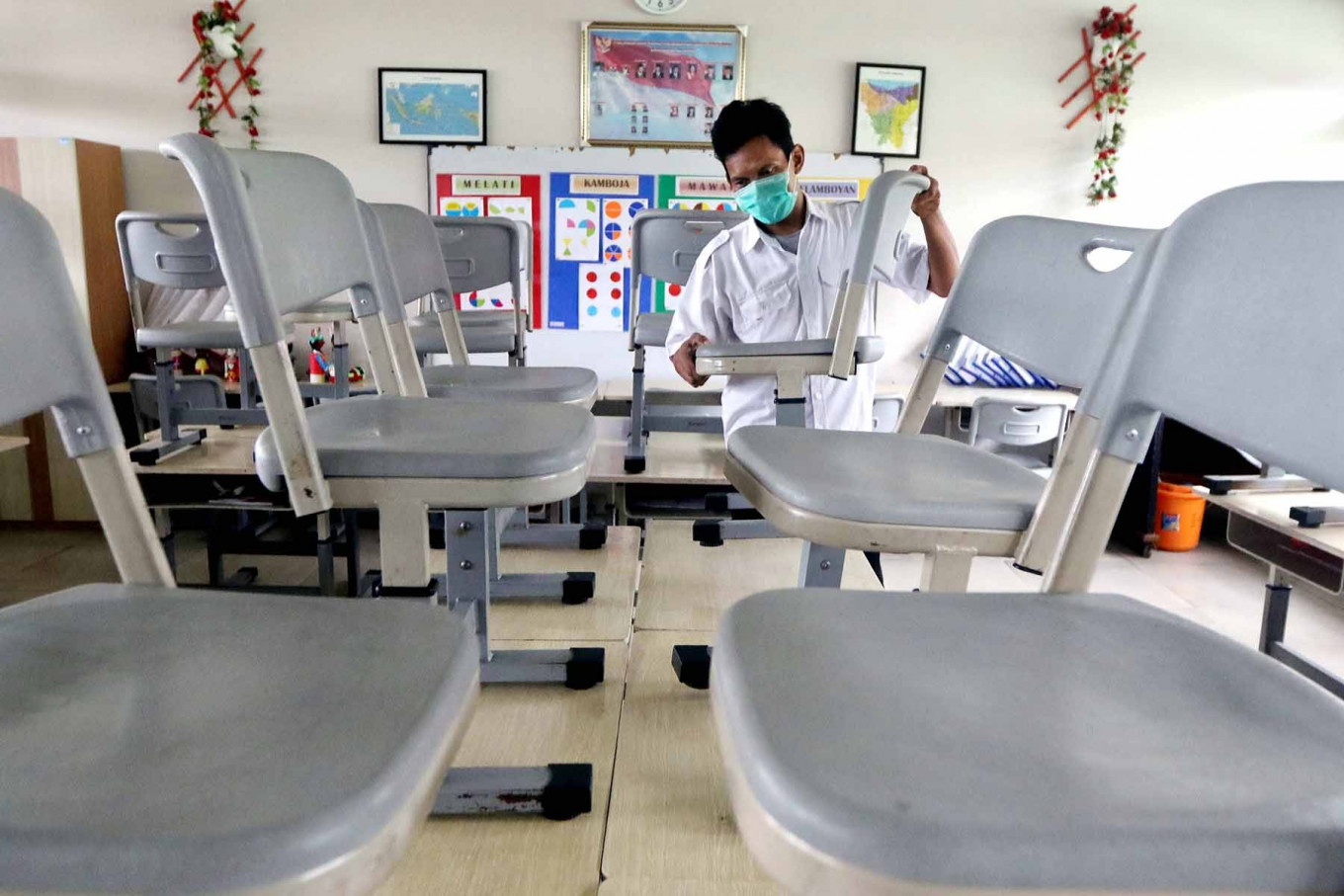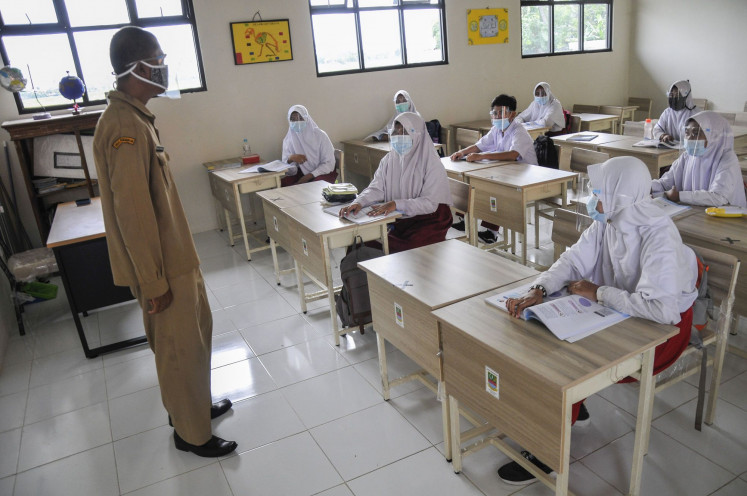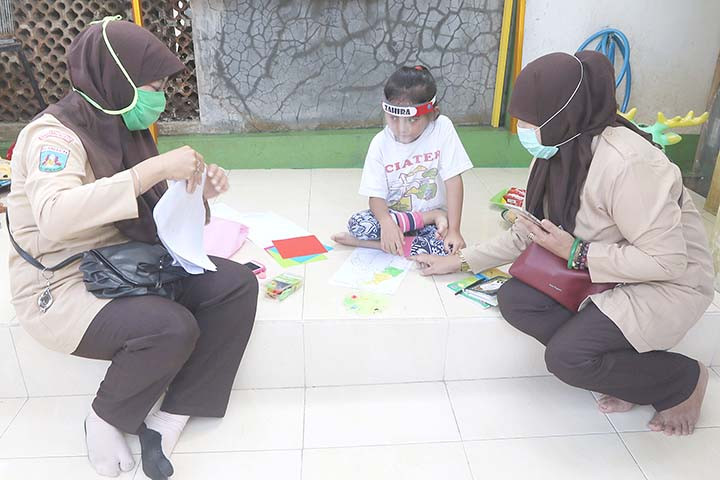Schools prep for 'back to normal'. But are we ready?
More than a year since the government imposed an online learning policy, it is pushing for the resumption of offline schooling for kindergartens and early childhood education. But are all stakeholders – schools, teachers, parents and students – ready for this?
Change Size

“We’ve prepared everything,” said Maria Yasinta, a teacher at Mardi Wiyata Catholic Kindergarten in Malang, East Java. “Most of our kindergarten parents want their kids [back at] school. Are they worried? Of course. But we hope our new and improved health protocols will reassure them.”
The school has left no stone unturned in their quest to provide a safe learning environment for their students, with teachers and parents banding together in an independent COVID-19 task force to oversee the preparations. The school’s capacity will be halved. Student arrival and departure times will be spaced out with a 30-minute window to disinfect the grounds. And soon, the kindergarten plans to trial limited in-person learning.
After more than a year of struggling with online learning, Yasinta is more than ready for a change back to normal, and she is far from alone.
Indonesian schools are expecting a gradual return to normalcy after then-Education and Culture Minister Nadiem Makarim stated in March that schools must provide blended learning that combines remote and classroom methods for students and parents as early as July 2021.
For the country’s uneven education system, the minister’s statement came as a great relief.
Soaring COVID-19 cases and austere localized measures meant that most schools had to stop in-class learning and switch to virtual classes in March 2020. That August, the education ministry said the measure had affected at least 68 million students nationwide, and that almost 10 percent were children in kindergarten and early childhood education (PAUD).
To say it hasn’t been smooth sailing would be a gross understatement. Never minding the technical issues, the practical challenges involved teachers redesigning class lessons for online delivery and instruction, parents stressed and overworked from managing at-home classes, as well as students experiencing boredom, inactivity and screen fatigue. Added to this were slashed wages and job cuts among teachers at all levels and statuses.

The sudden switch to online learning also exposed the existing inequities in access to education and technology. Last May, Nadiem was ridiculed for expressing surprise at the fact that large parts of the vast archipelago still didn't have access to a reliable internet connection, meaning that online learning was both improbable and impractical for many.
Early childhood education faced additional challenges, with teachers unable to manage unruly or unenthusiastic students and parents cracking under the strain of being a surrogate teacher’s assistant while being a full-time parent or worse, a working parent.
“Early childhood is a time of discovery and play for children,” said psychologist Sani Hermawan, “so it’s difficult to ask young children to stay in front of a screen at home for a long time.”
For parents who were also teachers, juggling their professional and parenting responsibilities was an uphill battle.
“It’s a challenge dividing my time for online lessons while still caring for my two children,” said Yasinta.
In addition, teaching from home meant a sudden vacuum in faculty interaction and sharing at school. “It’s important to keep my colleagues motivated through this difficult time,” she said.
As teachers struggled to teach effectively through digital means, which were often untried and untested, many people grew increasingly concerned that parents might cease to see the benefits of formal schooling and pull their children out of early childhood education entirely.
This included the education minister, who warned in August 2020 that the nationwide school closures would “cause lasting, permanent effects”.
“We are at risk of creating a lost generation,” he added.
Alarmingly, enrollment at PAUD institutions in January 2021 had dropped by over 600,000 students for the new school year.
Wary of creating this so-called lost generation of learners, the government pushed through an ambitious plan to vaccinate all teachers in the first phase of its inoculation program. It went even further in prioritizing kindergarten and PAUD teachers, arguing that their students “are not well suited to online learning”.
Over the past two months, schools in the provinces of East Java, Banten, Yogyakarta and South Sulawesi have been trialing in-class learning at limited capacity in hopes of building trust among parents toward resuming offline classes.
The government is also confident that its vaccination drive has paid dividends. A recent survey by the Early Education Directorate’s technical team revealed that 89 percent of PAUD teachers in eight provinces were fully vaccinated, while 95 percent of all 34 provinces stated their readiness to run limited offline learning at PAUD schools.
Despite these early strides, some remain unconvinced about the safety of offline learning for young children.
“Vaccination for teachers doesn’t guarantee the children’s safety,” said Anastasia Rima, secretary-general of the Homeschooling and Alternative Education Association (Asah Pena). “The security guards, gardeners, drivers and other school workers, and especially the parents, are not vaccinated yet.”

For Rima, the struggle of teachers and parents amid the pandemic was symptomatic of a wider issue in the national education system.
“Schools, parents and governments aren’t used to working together and communicating as equals to provide better education for children. This means that when an emergency situation like this happens, we’re slow to adapt,” she said.
“Many teachers simply copy-paste their offline teaching methods to online learning. Teachers must shift their paradigm from being providers of academic knowledge to providers of learning methods and training parents to become partners in the educational process.”
No matter the outcome of the offline school trials, Yasinta agrees that teachers must continue to foster partnership with parents.
“We’ve been doing a mixture of offline home visits and online learning [based on] feedback from parents. Even the online class schedules are discussed with the parents. Some prefer online classes after working hours so they can accompany their children after returning from work,” she said.
“If offline schooling returns, parents are key in persuading children to follow the appropriate health protocols,” Yasinta continued. “Children follow their parents' lead. If the parents follow the health protocols at home, the children will be used to it and we’ll be able to keep them safe at school.”
Read also: Unpraised heroes: Educators do their best with challenge of online classes
Read also: Online learning & burnout: Why some parents are keen for their children to go back to school









